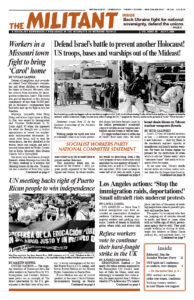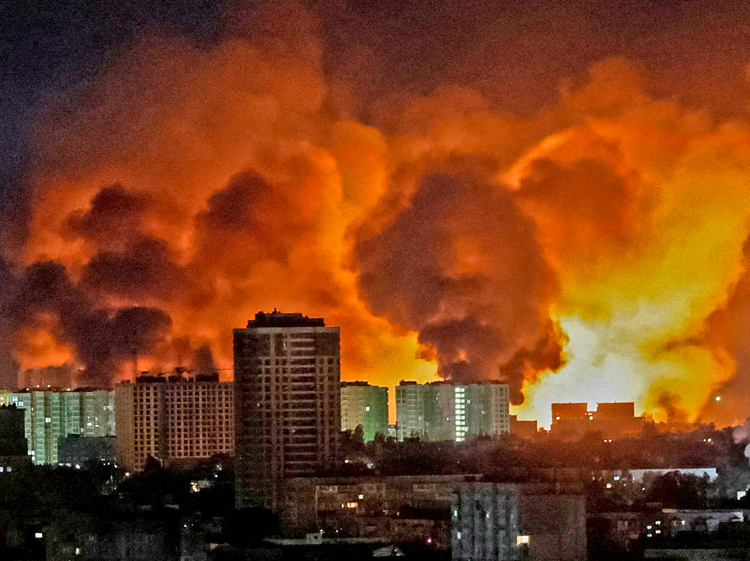After seizing Crimea and parts of Donetsk and Luhansk provinces in Ukraine 11 years ago, and over three years since his full-scale invasion, Russian President Vladimir Putin is trying to inflict as much pain as possible targeting Ukraine’s cities all across the country. The working people of Ukraine continue to tenaciously resist his moves to subjugate them.
Drone and missile strikes aimed at civilians are at an all-time high, while Russian troops suffer massive casualties — over 1 million since February 2022 — to make some grinding advances in eastern Ukraine.
In the first six months of 2025, Russian forces have averaged 1,286 deaths and severe injuries a day.
The Putin regime regards Russian workers and farmers in uniform as expendable cannon fodder. It is seeking to expand its hold in the Donetsk and Luhansk provinces, advance in the Zaporizhzhia and Kherson provinces in the south and establish buffer zones in the Sumy and Kharkiv regions in the northeast.
Despite the Donald Trump administration’s repeated calls for a ceasefire, which is backed by Kyiv, the Kremlin continues to demand Ukrainian forces cede those first four provinces to Russia.
In an annual economic forum in St. Petersburg, Russia, once touted as “Putin’s Davos” but now much more sparsely attended, the Russian president declared June 20 that he didn’t “rule out” taking the city of Sumy. He repeated his view that Ukrainians are just Russians and “all of Ukraine is ours.”
To replenish troop losses, Moscow pays $24 million per day in bonuses trying to attract recruits. There is widespread opposition to the war among working people in Russia, which is suppressed by far-reaching government repression.
Conscripts from the Russian Federation’s non-Slavic minorities and indigenous peoples are forced onto the front lines and suffer disproportionate casualties. At home, these ethnic groups suffer discrimination in jobs, housing and employment — facing ads reading “for Slavs only.”
The Kremlin’s spending on the military and war production grew 25%, to 13.1 trillion rubles ($170 billion) last year, consuming almost a third of the federal budget. This drove prices up 10% amid war-induced labor shortages. Russia’s economy minister admitted June 19 the country is on the verge of a recession.
Moscow-Pyongyang ties deepen
Largely isolated internationally, Moscow has come to rely on military ties with Pyongyang and Tehran. The North Korean government announced June 17 that it would send 1,000 sappers to clear land mines and 5,000 military construction workers to rebuild infrastructure in the Kursk region of Russia, after a Ukrainian incursion there was bombed by Moscow.
Some 14,000 North Korean soldiers joined Russian forces in Kursk, taking heavy casualties. Ballistic missiles provided by Pyongyang, and drones from Tehran, are increasingly used by Moscow targeting Ukrainian cities.
Nearly half of artillery rounds fired by the Russian army now come from North Korea. Sale of these munitions, as well as artillery and mortar systems, have brought millions in reimbursement, much needed by North Korea, which is heavily impacted by U.S.-led economic sanctions. These primarily come down on working people there.
Ukraine unions appeal for solidarity
Ukraine’s two main union federations issued an appeal for working-class solidarity at a June 2-13 International Labour Conference in Geneva. It was signed by Mykhailo Volynets, president of the Free Trade Unions of Ukraine (KVPU), and Grygorii Osovyi, president of the Federation of Trade Unions of Ukraine.
The appeal noted Moscow had launched June 6 one of the largest attacks since its invasion. Ukrainian cities from Kyiv to Lviv were “targeted with 407 Shahed kamikaze drones, six ballistic missiles, and 36 cruise missiles. The targets were not military installations. The targets were peaceful cities, homes, hospitals, energy infrastructure, schools — everything that sustains life.” They resulted in “lost lives, shattered families and destroyed workplaces.”
A related KVPU appeal noted, “since the full-scale invasion began, over 13,000 civilians — including more than 600 children — have lost their lives and at least 16,000 civilians, including trade union activists and members, remain in illegal Russian captivity.
“In the temporarily occupied territories of Ukraine, the Russian occupying forces continue to commit grave human rights violations, including terror, executions, and the persecution of workers and trade unionists.”
The unions have also had to fight efforts by Ukraine’s capitalist rulers and their government to take advantage of war conditions to attack the unions, cut back their reach and outlaw their right to strike.
The joint union appeal calls on all supporters of working-class solidarity, dignity and humanity to “unequivocally condemn the latest wave of Russian bombings of Ukrainian cities and the killing of civilians.” It also called for “the release of all Ukrainian prisoners of war and civilian hostages and the immediate return of all abducted Ukrainian children.”
The trade union federations invited those attending the International Labour Conference to join a solidarity action for Ukrainian working people at Geneva’s “Broken Chair” monument June 9.


